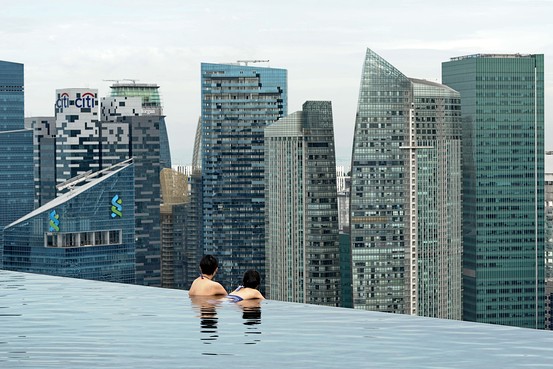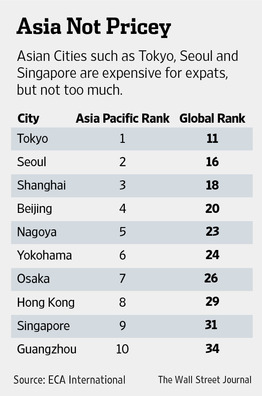Franchising, retail, business

12/06/2014
Singapore was ranked the world’s most expensive place for expatriates in a March survey, but in a new study released Tuesday, the city-state doesn’t even make the top 20.
The global ranking published by consulting firm ECA International, found that Venezuela’s capital Caracas was the world’s most expensive city for expatriates out of the 257 surveyed. Oslo came in second. No city in Asia ranked within the top 10, with Tokyo falling to 11th place from 6th since June last year.
Japan’s capital was the world’s most expensive place for expats just two years ago, according to a statement by ECA that elaborated on the reasons for the rankings. Tokyo’s depreciation, it said, was partly due to the weakening of the Japanese yen, which has balanced out higher prices.After Tokyo, Seoul is the second-most expensive Asian city with a global rank of 16. Shanghai and Beijing follow with 18th and 20th ranks respectively. Singapore, ranked the world’s most expensive city by the Economist Intelligence Unit’s Cost of Living Survey in March, is a distant 31st on the ECA list.
 According to ECA, which provides data and software to more than 1,500 companies to help them decide on staff placements globally, the difference between the two surveys is in what’s included in the basket of goods it weighs.
According to ECA, which provides data and software to more than 1,500 companies to help them decide on staff placements globally, the difference between the two surveys is in what’s included in the basket of goods it weighs.
The weight attached to different items in the baskets can cause such starkly different results, said Lee Quane, the regional director of ECA International.
For example, if one survey collects data from only upmarket stores or measures only expensive luxury goods consumed by expatriates, the results can be different, he said.
ECA conducts two cost of living surveys each year to help calculate cost of living allowances so that their employees’ spending power is not reduced while on international assignment. The company says it compares a basket of consumer goods and services commonly purchased by employees in 440 global locations.
Living costs for employees are affected by inflation, availability of goods and currency exchange rates, it adds. Some costs, such as home rentals, utilities, car purchases and school fees are not included in the ECA basket, as they are usually covered by employers as separate allowances, according to the statement.
The Economist Intelligence Unit survey compares all cities to New York as a base and includes the price of cars, which can make a huge difference in a city such as Singapore, where new car buyers must also buy a certificate of entitlement. That document currently costs more than 63,000 Singapore dollars ($50,372) for small cars and still more for bigger ones, more than the cost of a sedan in many markets.
“We like to believe our study is more representative,” said Mr. Quane, when asked to explain how different surveys could produce such contrasting results.
Jon Copestake, the EIU’s retail and consumer goods analyst, countered that it was normal for survey findings to differ.
“We do not see different surveys as being more or less representative, but as applying different methodologies for clients to choose from,” he said in an email. “The basket of goods we employ and the weights we apply may be different. The list of cities covered will also differ, as will the exchange rates used, which are a crucial metric in driving the dynamics of the relative cost of living.”
The thing the two surveys do generally agree on, however, is which countries are the world’s cheapest for expatriates – Pakistan and India. Karachi ranks as the world’s least expensive city in the ECA survey at 257, and living in Islamabad at rank 255 is only a tad more expensive. Most Indian cities are also relatively low in the list with Kolkata ranked 251, Bangalore 242, Mumbai 225 and the capital New Delhi at 208.
Mumbai, Karachi and New Delhi, respectively, were the three least expensive cities out of 131 in the Economist Intelligence Unit rankings.